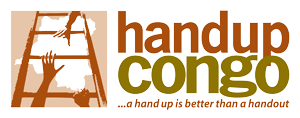A snapshot of Lotumbe’s Pygmy population
Rev. John Entonto, elected by the Lotumbe community as its development facilitator since 2014, has gained valuable insights into the lives of the local Pygmy population that HandUp Congo supports through various projects including sustainable beekeeping.
Rev. Entonto tells us that approximately 3500 Pygmies live in Lotumbe – half of the community’s total population of 7000. Pygmies are known as Batwa in the local Mongo language, or indigenous peoples. They are traditional forest dwellers, who have been displaced by deforestation.
Rev. John Entonto
A typical Pygmy home in Lotumbe. – Photo Lucy Hobgood-Brown
Illegal logging combined with the activities of thousands displaced by conflict, who cut down trees for shelters, to cook and to grow vegetables, have forced Pygmies out of their natural forest habitat. They are originally from the forest area of nearby Bandundu province, with many choosing to settle permanently in Lotumbe after the Protestant missionaries of the Disciples of Christ Community of Congo established a parish in the village in the early 1900s.
Today Lotumbe, located in Equateur Province, has a large General Reference Hospital, a free Health Centre for the most vulnerable people, a kindergarten, two primary schools and two secondary schools overseen by the Disciples. As a result, explains Rev. Entonto, the Pygmy population see Lotumbe as an opportunity for a more stable life, free from the suffering, family conflicts and severe illnesses they had previously known in Bandundu province.
Unfortunately, the young pastor tells us, Pygmies face roadblocks to full social integration in Lotumbe due to different cultural practices and historic discrimination by the Bantu tribe majority. Rev. Entonto observes however that “currently things are changing in the Bantu-Pygmy relationship … [they] eat, study, and work on projects together”.
Pygmies still live a precarious life due to poverty, or lack of opportunities and inexperience. This too often results in poor access to health care, high infant mortality and food insecurity. While the Health Centre welcomes Pygmies and takes care of them free of charge, patients that need to be transferred to the hospital need financial support.
Lotumbe community development committee. 6th from left: Rev. Entonto. 7th from right: Rev. Eliki Bonanga, Legal Representative and President of the 1 million member Disciples of Christ Community in Congo. - Photo Lucy Hobgood-Brown
In order to address these issues, the leaders elected to serve on Lotumbe’s community development committee have introduced free healthcare and education for vulnerable community members including orphaned girls. They also facilitate the integration of Pygmies into Lotumbe’s community life by ensuring parity when distributing development resources and providing training in sustainable beekeeping and farming.
Progress has also been made in agriculture, with many Pygmies working independently in the fields to produce maize and cassava, as well as travelling by canoe to riverside markets to sell their products. But despite hard work, the yield remains low because they can only plant crops that are readily available – often accessing poorer quality seeds.
Rev. Entonto has told us that “the presence of Pygmies in Lotumbe is an opportunity for the whole community”. He admires their knowledge of the forest and the vibrant Pygmy culture of folk singing and dancing.
“Their empathy and harmonious spirit contribute positively to Lotumbe”, he says.
To strengthen food security for the Pygmy population, HandUp Congo in collaboration with the community development committee aims to sow two hectares of fertile land with healthy cassava cuttings.
USD $800/ AUD $1077 is still required to fund the project. Can you help?
Tax deductibility is available to Australians through Rotary Australia World Community Service. Donations from around the world may be made through Rotary. Just click the button below.



